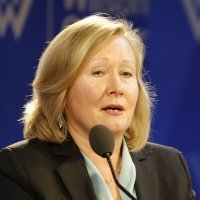The Last Superpower Summits: Gorbachev, Reagan, and Bush: Conversations that Ended the Cold War
The Last Superpower Summits: Gorbachev, Reagan, and Bush: Conversations that Ended the Cold War publishes the fullest verbatim account ever in print of the historic summit meetings between the American and Soviet leaders – Ronald Reagan, Mikhail Gorbachev, and George H.W. Bush – from 1985 to 1991. Obtained by the authors through the Freedom of Information Act in the U.S., from the Gorbachev Foundation and the State Archive of the Russian Federation in Moscow, and from the personal donation of Anatoly Chernyaev, these previously TOP SECRET transcripts from both sides include almost every word that Gorbachev, Reagan, and Bush actually said to each other. The transcripts combine with key declassified preparatory and after-action documents from both sides to create a unique interactive documentary record of these epochal highest-level talks – the conversations that ended the Cold War.
The authors argue in contextual essays and in detailed headnotes on each document that the summits fueled a process of learning on both sides. Geneva 1985 and Reykjavik 1986 reduced Moscow’s sense of threat and unleashed Reagan’s inner abolitionist. Malta 1989 and Washington 1990 helped dampen any superpower sparks that might have flown in a time of revolutionary change in Eastern Europe, set off by Gorbachev and by Eastern Europeans (Polish Solidarity, dissidents, reform Communists). Moscow 1991 featured Bush at his peak after winning the first Gulf War, and Gorbachev on the downward slide that would end with the dissolution of the Soviet Union in December 1991. The high level and scope of the dialogue between these world leaders was unprecedented, and likely never to be repeated.
Svetlana Savranskaya is director of Russia programs and Thomas Blanton is executive director at the National Security Archive (George Washington University). They won the 2011 Link-Kuehl Prize from the Society for Historians of American Foreign Relations for their book, “Masterpieces of History”: The Peaceful End of the Cold War in Europe, 1989 (CEU Press), and have co-authored more than three dozen electronic briefing books on Cold War summits, dissidents, flashpoints, and legacies (see http://nsarchive.gwu.edu). She graduated from Moscow State University and earned her Ph.D. at Emory University; he is a graduate of Harvard University and won the 2004 Emmy Award for news and documentary research.
The Washington History Seminar is co-chaired by Eric Arnesen (George Washington University) and Christian Ostermann (Woodrow Wilson Center) and is sponsored jointly by the National History Center of the American Historical Association and the Wilson Center's History and Public Policy Program. It meets weekly during the academic year. The seminar thanks the Society for Historians of American Foreign Relations and the George Washington University History Department for their support.
Speakers


Director of Russia Programs, National Security Archive
Hosted By

History and Public Policy Program
A leader in making key foreign policy records accessible and fostering informed scholarship, analysis, and discussion on international affairs, past and present. Read more


Cold War International History Project
The Cold War International History Project supports the full and prompt release of historical materials by governments on all sides of the Cold War. Read more
